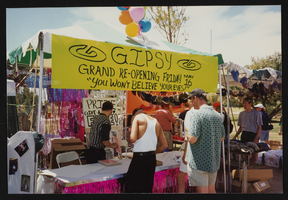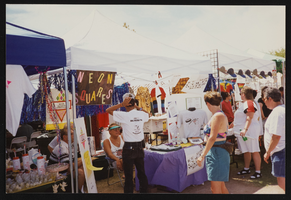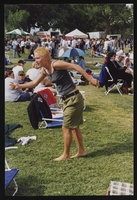Search the Special Collections and Archives Portal
Search Results
Cheryl Radeloff oral history interview
Identifier
Abstract
Oral history interview with Cheryl Radeloff conducted by Suzanne Becker on July 27, 2006 for the UNLV @ 50 Oral History Project. In this interview Cheryl Radeloff discusses moving to Las Vegas, Nevada to accept a research position at the University of Nevada, Las Vegas (UNLV), then being hired as a graduate assistant for the UNLV sociology department, and finally her involvement with the UNLV Gay Straight Alliance. She also talks about receiving her PhD in 2004 and going to the American Sociological Association Job Employment Fair in 2005.
Archival Collection

Gipsy nightclub booth at Gay Pride: photographic print
Date
Archival Collection
Description
Image
Audio recording clips of interview with Hazel Gay by Claytee D. White, December 2, 1995
Date
Archival Collection
Description
Interview with Hazel Gay conducted by Claytee D. White on December 2, 1995. Hazel and her husband Jimmy Gay moved to Las Vegas in 1946, becoming leaders in the African American community during the civil rights era.
Sound
Tamara Pickett oral history interviews
Identifier
Abstract
Oral history interviews with Tamara Pickett conducted by Dennis McBride on November 01, 2002 and November 08, 2002 for the Las Vegas Gay Archives Oral History Project. In these interviews, Pickett discusses her early life and the traumatizing experiences that occurred during her childhood. Pickett remembers serving in the United States Army, beginning her transition to Tamara, and completing a sexual reassignment surgery in 1999. Later, Pickett talks about her activism work in Las Vegas, Nevada, campaigning for improved health care for transgender veterans, and her involvement with the transgender community in Las Vegas.
Archival Collection

Neon Squares booth at Gay Pride: photographic print
Date
Archival Collection
Description
Image

Community Church booth at Gay Pride: photographic print
Date
Archival Collection
Description
Image
Frankie Perez oral history interview
Identifier
Abstract
Oral history interview with Frankie Perez conducted by Elsa Lopez and Laurents Bañuelos-Benitez on November 05th, 2018 for the Latinx Voices of Southern Nevada Oral History Project. Perez speaks about the importance of sports, and the lack of Latinx representation in teachers during high school. Perez then discusses being placed on medical hold in the military, how his transition affected his physical tests, how the 2016 election may have impacted transgendered people in the military, and how everyday military personnel feel about transgendered people serving in the military. The interview concludes with Perez discussing the Lesbian, Bisexual, Gay, Transgendered, and Queer (LGBTQ) scene in Las Vegas, Nevada and about how culture impacts which clubs members of LBGTQ community would visit.
Archival Collection
Claytee D. White oral history interview
Identifier
Abstract
Oral history interview with Claytee D. White conducted by Stefani Evans on November 2, 2023 for the African Americans in Las Vegas: a Collaborative Oral History Project. In this interview, Claytee D. White, founding directory of the Oral History Research Center at UNLV Libraries, celebrates the twentieth anniversary of the OHRC by contributing her oral history to the collection.
She begins by explaining how the system of sharecropping worked in her family near rural Ahoskie, North Carolina, and she talks about the field work involved in raising cotton, tobacco, corn, and peanuts. The fifth of eight children and the first daughter, she shares memories of going into town with her mother, of admiring her women teachers, and of attending North Carolina Central College (now University) for two years before moving to Washington, D.C., and working for the telephone company.
After recalling her two years in D.C. and 22 years in Los Angeles, California, she describes "running away" to Las Vegas, Nevada in the early 1990s. Here, at the History department at UNLV, she recalls learning to conduct oral histories. White shares memories of her first interviews with Hazel and Jimmy Gay and Lucille Bryant. She talks of matriculating to the College of William and Mary for her PhD and of returning to Bertie County to live with her mother and administer the office of The Shaw University Center for Alternative Programs in Education (CAPE). She describes how she was offered the position of OHRC founding director, why it matters that she was an "opportunity hire," and how it feels to be the only Black person in a room.
Archival Collection

Unidentified woman dancing at Gay Pride: photographic print
Date
Archival Collection
Description
Image

Transcript of interview with Jimmy Gay by Perry Kaufman, April 12, 1972
Date
Archival Collection
Description
Interview with James A. Gay III conducted by Perry Kaufman on April 12, 1972. Arriving in 1946 from Fordyce, Arkansas, Gay became the first African-American mortician in Las Vegas. He later worked as Assistant Manager of the Sands Hotel and Casino and Union Plaza while serving as an executive board member of the Culinary Union. Instrumental in the Las Vegas community, Gay worked to improved race relations, addressing social, economic, and civic issues. Gay was awarded an honorary degree from the University of Nevada, Las Vegas in 1988.
Text
